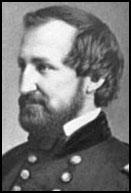William Rosecrans

William Rosecrans was born in Kingston, Ohio, on 6th September, 1819. He studied at the U.S. Military Academy at West Point and after graduating in 1842 joined the United States Army.
Rosecrans specialized in engineering and after a period based in New England he lectured on the subject at West Point.
In 1854 he resigned from the army and became a civil engineer, architect and oil refiner in Ohio. He also joined the Democratic Party and was active in local politics.
On the outbreak of the American Civil War Rosecrans joined the Union Army and was commissioned as a colonel in the Ohio Volunteers. He joined the staff of George McClellan in June, 1861, and successfully defeated Robert E. Lee at Rich Mountain.
Rosecrans took part in battles at Iuka and Corinth before being given the rank of major general and the command of the Army of the Cumberland. In December, 1862, Rosecrans moved his army towards Chattanooga. General Braxton Bragg, commander of the Army of Tennessee, who had just retreated from Perryville, was also in the area.
When Bragg's scouts told him of the Army of the Cumberland movements, Bragg decided to confront them at Murfreesboro, on the Stones River. Braxton Bragg attacked Rosecrans on 31st December. Taken by surprise Rosecrans was in danger of being routed but he was eventually able to repulse the attack. Rosecrans was able to hold his position for the next two days and on the night of the 3rd January, 1863, Bragg and his Army of Tennessee retreated to Tullahoma. It is estimated that the Union Army lost 12,906 men in the battle.
At Chickamauga (September, 1863) where he made a serious tactical blunder that opened up a gap in the Union Army lines. Rosecrans and his men fled to Chattanooga leaving General George Thomas on the battlefield. General Braxton Bragg followed and was attempting to starve Rosecrans out when union forces led by Ulysses S. Grant, Joseph Hooker and William Sherman arrived.
As a result of the Chickamuga disaster Rosecrans was transferred to the Department of Missouri. He went on sick leave in December, 1864, but did not officially resign until on 28th March, 1867.
After the war Rosecrans returned to politics and represented California in the House of Representatives (1881-85) and served as register of the U.S. Treasury. William Rosecrans died on 11th March, 1898.
Primary Sources
(1) In his autobiography, Personal Memoirs of U. S. Grant, Ulysses Grant looked at William Rosecrans record in the American Civil War (1885)
After the fall of Vicksburg I urged strongly upon the government the propriety of a movement against Mobile. General Rosecrans had been at Murfreesboro, Tennessee, with a large and well-equipped army from early in the year 1863, with General Braxton Bragg confronting him with a force quite equal to his own. But after Vicksburg, Bragg's army was largely depleted to strengthen General Joseph Johnson, in Mississippi, who was being reinforced to raise the siege. I frequently wrote General Halleck suggesting that Rosecrans should move against Bragg. General Halleck strongly approved the suggestion, and finally wrote me that he had repeatedly ordered Rosecrans to advance, but that the latter had constantly failed to comply with the order.
Finally he did move, on the 24th June. Rosecrans very skillfully maneuvered Bragg south of the Tennessee River, and through and beyond Chattanooga. If he stopped and entrenched, and made himself strong there, all would have been right and the mistake of not moving earlier partially compensated. But he pushed on, with his forces very much scattered, until Bragg's troops from Mississippi began to join him. Then Bragg took the initiative. Rosecrans had to fall back in turn, and was able to get his army together at Chickamauga. Some miles south-east of Chattanooga, before the main battle was brought on. The battle was fought on the 19th and 20th September, and Rosecrans was badly defeated, with a heavy loss in artillery and some sixteen thousand men killed, wounded or captured.
(2) Henry Villard worked for the New York Tribune during the American Civil War. In his memoirs he wrote about the abilities of William Rosecrans.
General Rosecrans was of middle stature, with a broad upper body and rather short, bow legs (owing to which peculiarities he presented a far better appearance when mounted than on foot); a head not large, with short, thin, light-brown hair; a narrow, long face with kindly blue eyes, strong nose and mouth, and scanty full greyish beard. His general expression was very genial. He was a great talker, voluble, earnest, and persuasive. He invited me to his camp so urgently that I grew suspicious, and thought that he cared more for my pen than my person. My subsequent experience proved that I had judged him correctly.

